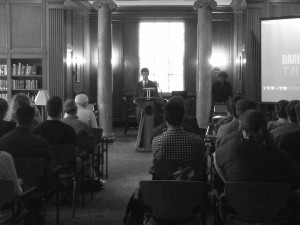Junior Mechanical Engineering student William Green received NASA’s $10,000 Astronaut Scholarship Foundation Award. Green was lauded for his outstanding accomplishments and his drive toward a creative career looking to advance scientific knowledge and technology. NASA Astronaut Sam Gemar presented Green with this award.
Green thanked his family, friends, professors, and the foundation for helping him to achieve this honor. He discussed innate human curiosity, which he described as the best scientific tool, and elaborated on how curiosity motivates us to keep looking further in every direction to find answers to the biggest questions.
“There is nothing more precious, more worthwhile to preserve, than that which we still have to teach,” Green said.
Green shared what engineering means to him.
“Engineering is a worldview. It looks at cause and effect and tries to figure out how to exploit the causes to affect a better world for everyone,” Green said.
Green plans to work in building and designing optical telescopes to explore the deepest parts of the universe. He shared some advice he gained through his own experiences.
“Try things and hate them until you try something that you like. Otherwise, you may never find that thing that you like. Don’t be afraid if it is too difficult. If you do enjoy it, it will come easily to you.”
Gemar also shared his personal experiences as a NASA Astronaut.
A former NASA astronaut and a Lieutenant Colonel in the U.S. Army, Gemar has flown on three Space Shuttle missions: STS-38 (Atlantis), STS-48 (Discovery), and STS-62 (Columbia). He has spent over 581 hours in space, orbiting the Earth 385 times. He has also served as a Capsule Communicator (CAPCOM) for Shuttle missions.
Gemar has performed many tasks in space including operations for the Department of Defense, deployment of the Upper Atmosphere Research Satellite (UARS), and various scientific experiments in microgravity.
Gemar said the most difficult part of being an astronaut wasn’t the complexity of the missions, the dangers of liftoff or reentry, or even the selectiveness of the astronaut program (13 astronauts are chosen out of over 5000 applicants). The hardest thing, Gemar said, was “the night before. Not knowing the outcome of tomorrow’s flight […] But any apprehension or butterflies you have the night before are gone on launch day.”
The Astronaut Scholarship Foundation was founded in 1984 by the original Mercury 7 Astronauts to encourage outstanding young Americans to pursue careers in science and engineering, especially in fields with strong research and applied components. Its mission is “to aid the United States in retaining the world leadership and technology by providing college scholarships for the very best and brightest students pursuing science, technology, engineering, or math degrees.”
In addition, the Astronaut Scholarship Foundation strongly promotes the importance of science and technology to the general public by facilitating unique programs and special events.
Rubenzahl is a member of
the class of 2018.






